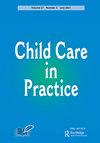A Narrative Review that Explores the Influence of Physical Activity on Care Experienced Children and Young People’s Mental Health and Wellbeing
IF 1.4
Q3 FAMILY STUDIES
引用次数: 0
Abstract
Care-experienced children and young people are likely to experience early adversities that place them at increased risk of developing physical and mental health difficulties. Physical activity can help address the varied needs and interests of care-experienced children and young people and become a tool to manage mental health and well-being challenges. Growing research has explored the positive influence that physical activity can have on the lives of care-experienced children and young people, however, the literature has mainly focused on the barriers and enablers of engagement in physical activity. Though there is a growing amount of work in this area, there remains a need for further research that explores the influence that physical activity can have on the mental health and well-being of care-experienced children and young people. A narrative review was conducted to explore the qualitative literature that has captured the influence of physical activity on care-experienced children and young people’s mental health and well-being, including what has been meaningful and why. Additionally, exploring qualitative research has helped to prioritise care experienced children and young people’s voices, which tend to be overshadowed by the views of researchers, carers, or social care professionals. The findings of the review report that physical activity can influence the mental health and well-being of care-experienced children and young people by providing meaningful enjoyment, and the development of relational trust, skills, and emotional regulation. Further research is needed to provide a thorough representation of the changeable and long-term influence of physical activity on the mental health and well-being of care-experienced children and young people, whilst prioritising their voices.探讨体育活动对护理经历儿童和青少年心理健康和福祉的影响的叙述综述
接受过照料的儿童和青少年很可能在早期经历逆境,使他们面临更大的出现身心健康困难的风险。身体活动可以帮助解决有护理经历的儿童和青少年的各种需求和兴趣,并成为管理心理健康和福祉挑战的工具。越来越多的研究探索了体育活动对经历过护理的儿童和青少年生活的积极影响,然而,文献主要集中在参与体育活动的障碍和促进因素上。尽管这方面的工作越来越多,但仍需要进一步的研究来探索体育活动对经历过护理的儿童和青少年的心理健康和福祉的影响。进行了一项叙述性审查,以探索定性文献,这些文献捕捉了身体活动对经历过护理的儿童和青少年的心理健康和福祉的影响,包括什么是有意义的以及为什么有意义。此外,探索定性研究有助于优先考虑有经验的儿童和年轻人的声音,这些声音往往被研究人员、护理人员或社会护理专业人员的观点所掩盖。回顾报告的结果表明,体育活动可以通过提供有意义的享受,以及关系信任、技能和情绪调节的发展,影响有护理经历的儿童和青少年的心理健康和福祉。需要进一步的研究,以全面反映身体活动对经历过护理的儿童和青少年的心理健康和福祉的变化和长期影响,同时优先考虑他们的声音。
本文章由计算机程序翻译,如有差异,请以英文原文为准。
求助全文
约1分钟内获得全文
求助全文
来源期刊

Child Care in Practice
Nursing-Community and Home Care
CiteScore
3.30
自引率
5.30%
发文量
32
期刊介绍:
Child Care in Practice is a quarterly, peer-reviewed journal that provides an international forum for professionals working in all disciplines in the provision of children’s services, including social work, social care, health care, medicine, psychology, education, the police and probationary services, and solicitors and barristers working in the family law and youth justice sectors. The strategic aims and objectives of the journal are: • To develop the knowledge base of practitioners, managers and other professionals responsible for the delivery of professional child care services. The journal seeks to contribute to the achievement of quality services and the promotion of the highest standards. • To achieve an equity of input from all disciplines working with children. The multi-disciplinary nature of the journal reflects that the key to many successful outcomes in the child care field lies in the close co-operation between different disciplines. • To raise awareness of often-neglected issues such as marginalization of ethnic minorities and problems consequent upon poverty and disability. • To keep abreast of and continue to influence local and international child care practice in response to emerging policy. • To include the views of those who are in receipt of multi-disciplinary child care services. • To welcome submissions on promising practice developments and the findings from new research to highlight the breadth of the work of the journal’s work.
 求助内容:
求助内容: 应助结果提醒方式:
应助结果提醒方式:


